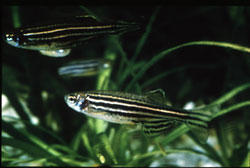 Researchers rely on zebra fish for many kinds of cancer studies because their genomes and immune systems are similar in many ways to their human counterparts. A little genetic modification, and poof! They can easily mimic human cancers, explains Nikolaus Trede, a researcher at the Huntsman Cancer Institute at the University of Utah.
Researchers rely on zebra fish for many kinds of cancer studies because their genomes and immune systems are similar in many ways to their human counterparts. A little genetic modification, and poof! They can easily mimic human cancers, explains Nikolaus Trede, a researcher at the Huntsman Cancer Institute at the University of Utah.
In doing this, Trede and his team believe they've identified a potential new treatment, dubbed Lenaldekar, or LDK, which defeated T-cell acute lymphoblastic leukemia in the genetically modified fish, and also showed promise slowing the disease in mice. Details are published in Blood, the journal of the American Society of Hematology.
Fish aren't people, simply put. So this will have to be tested many more times and for several years to see if it is beneficial in human leukemia cases. But the chance of a new, targeted treatment is one worth pursuing. As the researchers explain in their announcement, the particular leukemia they treated--known as T-ALL--is particularly hard to treat, and patients who come down with it often face poor chances of survival. Additionally, existing chemotherapy treatments for the disease are extremely toxic, the scientists note, because they target healthy and cancerous cells alike. So a targeted treatment can only help.
T-cell acute lymphoblastic leukemia erupts when genetic mutations make normal immature T-cells develop into leukemia cell "blasts," the researchers explain. They grow in density to the point at which they push out normal cells before spreading into the bloodstream and throughout the body.
To conduct the test, the scientists used a previously created line of zebra fish with altered, immature T-cells that glow when present in the body. After screening thousands of potential treatments, they identified Lenaldekar in vitro as a potential treatment for T-ALL that would also eliminate immature zebra fish T-cells. The drug, after two weeks of treatment, helped over 60% of zebra fish treated with the compound maintain a long-term remission of over 9 months. All of the fish treated with the control compound, by contrast, died after 40 days. In mice, the drug helped slow progression of the disease and it wasn't toxic.
What's more, the drug appeared to work against human cells from a variety of other types of leukemia. It also behaves differently than other drugs, the researchers claim, by hitting leukemia where it thrives and where the cancer grows through cell division.
(Image of zebra fish courtesy of Duke University & Medical Center)
- here's the release
- check out the journal abstract